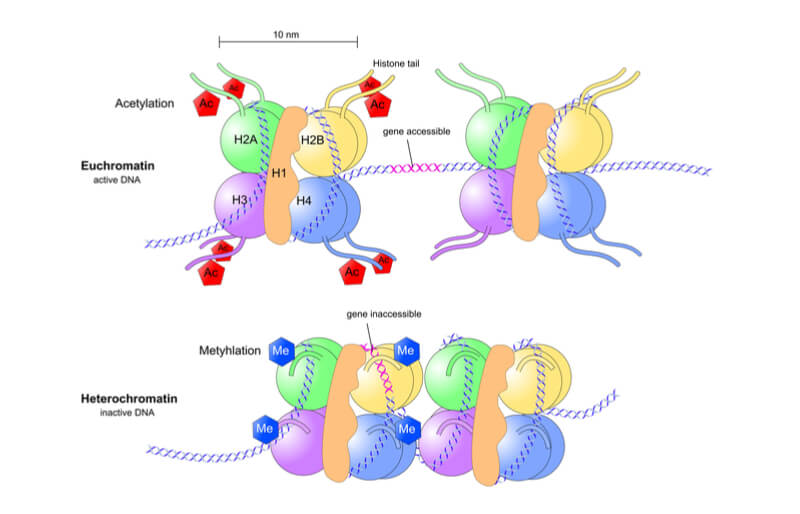Newsletter Signup - Under Article / In Page
"*" indicates required fields
Researchers have discovered that bacteria break down fruit and vegetables to produce chemicals that control our genes and could help to prevent cancer and fight infections.
British scientists from the Babraham Institute in Cambridge, UK, with colleagues from Brazil and Italy, have discovered a mechanism by which helpful bacteria in the gut can control the genes in our genome. The research, published in Nature Communications, shows that chemical signals released by bacteria can change the location of key chemical markers in the human genome. This information has opened the door to a potential new approach for the treatment of infections and the prevention of cancer.
Chemicals produced by bacteria as they digest fruit and vegetables can alter gene expression in the cells of the gut lining. The molecules that are responsible for this are short-chain fatty acids, which move into our cells where they change gene activity, ultimately affecting the behavior of our cells.
In particular, these short-chain fatty acids increase the number of crotonylations, a new type of chemical modification, or epigenetic marker, that is added to our genome. The molecules manage this by turning off an enzyme called histone deacetylase 2 (HDAC2), which modifies the packaging of DNA, making it less easy to access for the transcription machinery.

The study demonstrated that mice with reduced bacteria in their gut contained higher levels of HDAC2 than normal. Increased levels of this protein have previously been shown to be associated with a greater risk of colorectal cancer, meaning the regulation of crotonylation could help to prevent cancer. The study’s first author, Rachel Fellows, believes that identifying the role of HDAC2 in cancer “offers an interesting new drug target to be studied further.”
Epigenetics goes a step further than genetics by looking at the DNA modifications that control our genes and could give rise to a new wave of cancer treatments. A handful of epigenetic drugs, largely histone deacetylase inhibitors targeted at T cell lymphomas, have already made it onto the market. Elsewhere, 4SC’s candidate, resminostat, performed well in a Phase I trial, increasing overall median survival, while Oryzon Genomics is hoping to kick off the second generation of epigenetic drugs. The therapeutic use of epigenetics may not be limited to oncology, with a study suggesting that it could be used for the development of antivirals, maybe even against HIV/AIDS.
In addition, this research provides yet more evidence in support of the important role that ‘good bacteria’, or our microbiome, plays in keeping us healthy. This explains why biotechs are springing up around Europe to develop ways to harness its power to predict or treat disease.
Images – Shebeko / shutterstock.com; ellepigrafica / shutterstock.com
Oncology R&D trends and breakthrough innovations







